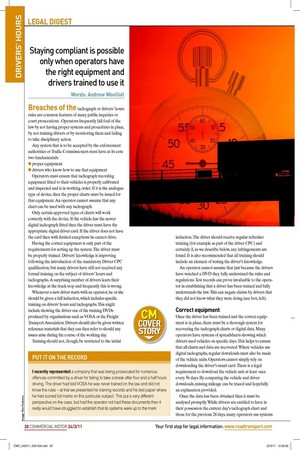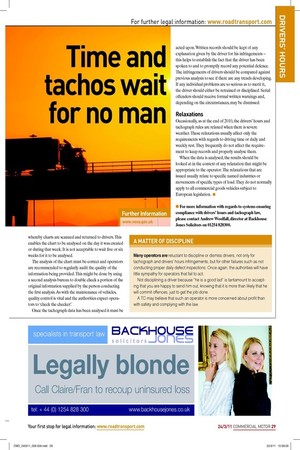Staying compliant is possible only when operators have the right equipment and drivers trained to use it
Page 22

Page 23

If you've noticed an error in this article please click here to report it so we can fix it.
Words: Andrew Woolfall
Breaches of the tachograph or drivers’ hours rules are common features of many public inquiries or court prosecutions. Operators frequently fall foul of the law by not having proper systems and procedures in place, by not training drivers or by monitoring them and failing to take disciplinary action.
Any system that is to be accepted by the enforcement authorities or Trafic Commissioners must have at its core two fundamentals: ● proper equipment ● drivers who know how to use that equipment Operators must ensure that tachograph recording equipment itted to their vehicles is properly calibrated and inspected and is in working order. If it is the analogue type of device, then the proper charts must be issued for that equipment. An operator cannot assume that any chart can be used with any tachograph.
Only certain approved types of charts will work correctly with the device. If the vehicle has the newer digital tachograph itted then the driver must have the appropriate digital driver card. If the driver does not have the card then with limited exceptions he cannot drive.
Having the correct equipment is only part of the requirements for setting up the system. The driver must be properly trained. Drivers’ knowledge is improving following the introduction of the mandatory Driver CPC qualiication, but many drivers have still not received any formal training on the subject of drivers’ hours and tachographs. A surprising number of drivers learn their knowledge at the truck stop and frequently this is wrong.
Whenever a new driver starts with an operator, he or she should be given a full induction, which includes speciic training on drivers’ hours and tachographs. This might include showing the driver one of the training DVDs produced by organisations such as VOSA or the Freight Transport Association. Drivers should also be given written reference materials that they can then refer to should any issues arise during the course of the working day.
Training should not, though, be restricted to the initial induction. The driver should receive regular refresher training (for example as part of the driver CPC) and certainly if, as we describe below, any infringements are found. It is also recommended that all training should include an element of testing the driver’s knowledge.
An operator cannot assume that just because the drivers have watched a DVD they fully understand the rules and regulations. Test records can prove invaluable to the operator in establishing that a driver has been trained and fully understands the law. This can negate claims by drivers that they did not know what they were doing (see box, left).
Correct equipment
Once the driver has been trained and the correct equipment is in place, there must be a thorough system for recovering the tachograph charts or digital data. Many operators have systems of spreadsheets showing which drivers used vehicles on speciic days. This helps to ensure that all charts and data are recovered. Where vehicles use digital tachographs, regular downloads must also be made of the vehicle units. Operators cannot simply rely on downloading the driver’s smart card. There is a legal requirement to download the vehicle unit at least once every 56 days. By comparing the vehicle and driver downloads, missing mileage can be traced and hopefully an explanation provided.
Once the data has been obtained then it must be analysed promptly. While drivers are entitled to have in their possession the current day’s tachograph chart and those for the previous 28 days, many operators use systems whereby charts are scanned and returned to drivers. This enables the chart to be analysed on the day it was created or during that week. It is not acceptable to wait ive or six weeks for it to be analysed.
The analysis of the chart must be correct and operators are recommended to regularly audit the quality of the information being provided. This might be done by using a second analysis bureau to double check a portion of the original information supplied by the person conducting the irst analysis. As with the maintenance of vehicles, quality control is vital and the authorities expect opera tors to ‘check the checker’.
BHJLeallyBlonde:Back
Once the tachograph data has been analysed it must be acted upon. Written records should be kept of any explanation given by the driver for his infringements – this helps to establish the fact that the driver has been spoken to and to promptly record any potential defence. The infringements of drivers should be compared against previous analysis to see if there are any trends developing. If any individual problems are so serious as to merit it, the driver should either be retrained or disciplined. Serial offenders should receive formal written warnings and, depending on the circumstances, may be dismissed.
Relaxations
Occasionally, as at the end of 2010, the drivers’ hours and tachograph rules are relaxed when there is severe weather. These relaxations usually affect only the requirements with regards to driving time or daily and weekly rest. They frequently do not affect the requirement to keep records and properly analyse them.
When the data is analysed, the results should be looked at in the context of any relaxation that might be appropriate to the operator. The relaxations that are issued usually relate to speciic named industries or movements of speciic types of load. They do not normally apply to all commercial goods vehicles subject to European legislation. ■ ● For more information with regards to systems ensuring compliance with drivers’ hours and tachograph law, please contact Andrew Woolfall, director at Backhouse Jones Solicitors on 01254 828300.














































